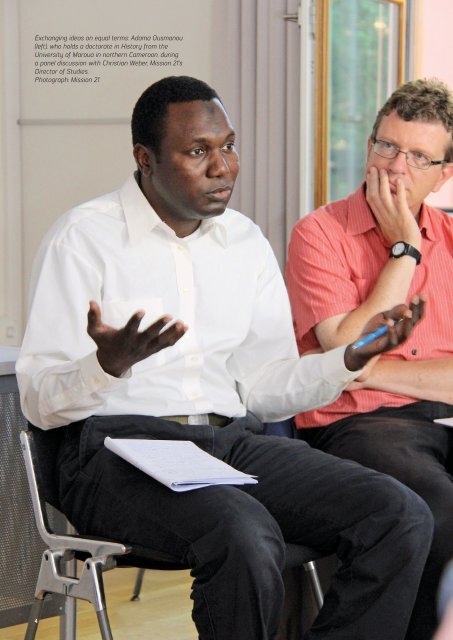Annual Report 2019
Annual Report 2019 Annual Report 2019
Exchanging ideas on equal terms: Adama Ousmanou (left), who holds a doctorate in History from the University of Maroua in northern Cameroon, during a panel discussion with Christian Weber, Mission 21's Director of Studies. Photograph: Mission 21 4
Editorial by the President Intercultural collaboration as a "visual aid" Do not conform to the pattern of this world, but be transformed by the renewing of your mind. (Romans 12:2) Johannes Blum What is the “pattern of this world”, or the spirit of the age? Generally speaking, it is probably whatever a particular generation considers to be right, what the media portrays as the truth, and what constitutes our culture. If we look back on past eras from this perspective, some contradictory considerations are also bound to surface. Nowadays, for instance, there are some voices urging us to go with the times, put the necessary reforms into practice and adapt our work to people’s existing circumstances and needs. But these critics reproach earlier generations of missionaries with having adapted too much to their times; they accuse them of failing to distance themselves sufficiently from the colonial spirit of the day. In “The Screwtape Letters”, the Irish writer C. S. Lewis gives a humorous description of the “spirit of the age”: each generation battles against the mistakes made by the previous generation, while turning a blind eye to its own errors. The previous generation had to cope with the problem of wildfires, whereas today’s generation is confronted with flooding – and yet everyone is still running around brandishing fire extinguishers! The spirit of the age often makes people blind to the errors committed by their own society. Intercultural cooperation offers a visual aid that helps us to see our own mistakes with its help, we can already reflect critically on our culture, here and now. Mission 21 has great potential in this area. If we can see and recognise our society and culture through the eyes of our partners in the global South, the spirit of the age can be put into perspective. Principles that we generally accept – such as progress, cost-effectiveness and efficient work processes – are suddenly brought into question. Intercultural Bible study opens up new avenues of access through dialogue with representatives of the churches. In the Democratic Republic of the Congo, and in discussions with Congolese Christians, I have arrived at a new understanding of many passages in the Bible. At the same time, I have realised that the Bible is very often interpreted in a Eurocentric way in Switzerland. But in the course of discussions among partners, dialogue of this sort is not merely an intellectual exercise: it also guides us towards personal relationships, and towards compassion. We share our partners’ joys; we are also brought face to face with their sufferings, which make us distressed. Vigorous support is the logical consequence. By joining with our partners, we endeavour to develop projects together that will enable native populations to lead their lives in dignity. Together, we want to foster peace and justice, to respond to the hardships of people who are afflicted by poverty and disease, and to give many of them the chance of a better future through education. We want to support our partner churches in actively practising charity in their neighbourhoods. By adopting their perspective, by engaging in intercultural dialogue and promoting interfaith understanding, these goals can be successfully achieved. Johannes Blum President, Mission 21 5
- Page 1 and 2: 2019 Annual Report
- Page 3: Education Exchange Research 22 Prom
- Page 7 and 8: Editorial by the Director Sustainab
- Page 9 and 10: International Relations Promoting s
- Page 11 and 12: Contributions to projects and progr
- Page 13 and 14: several “husbands” for her. She
- Page 15 and 16: Project contributions for education
- Page 17 and 18: This decentralised approach also ma
- Page 19 and 20: Maryenie: "I learned the craft of w
- Page 21 and 22: France Switzerland Germany Austria
- Page 23 and 24: Internationally committed to peacef
- Page 25 and 26: In 2019, a total of 4149 women, men
- Page 27 and 28: PEP! participants at the preparator
- Page 29 and 30: Too hot to miss: assisted by Pastor
- Page 31 and 32: Working towards sustainable solidar
- Page 33 and 34: Peter Gai Lual, Moderator of the Pr
- Page 35 and 36: Operating statement 31.12.2019 31.1
- Page 37 and 38: Commentary on the annual financial
- Page 39 and 40: Governing bodies and committees in
Exchanging ideas on equal terms: Adama Ousmanou<br />
(left), who holds a doctorate in History from the<br />
University of Maroua in northern Cameroon, during<br />
a panel discussion with Christian Weber, Mission 21's<br />
Director of Studies.<br />
Photograph: Mission 21<br />
4



